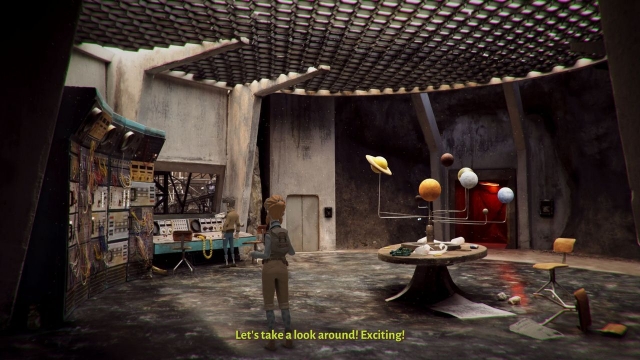Truberbrook

Truberbrook is a new point-and-click adventure from a German production company called btf. In the adventure, you play an American physicist named Hans Tannhauser, and you win an all-expenses-paid trip to the rural community of Truberbrook — even though you don’t remember entering any contests. When you arrive at your destination, you’re presented with even more mysteries, including a glowing thief, a missing cat, and a sinister entity called the Millennium Cooperative, but you gain the help of an anthropologist named Gretchen, and the two of you proceed to investigate the town and its surroundings to figure out what’s going on.
Like with all point-and-click adventures, you can control just about everything in the game using your mouse. You left click to move and you left click to interact with hotspots, and that’s about all that’s required of you. You can also press the spacebar to see the hotspots in the current location (although the “x” indicator is really small and sometimes hard to see), and you can press “i” to see your inventory.
Interestingly, the only thing you can do with your inventory is view it. You can’t examine the items there, or select them and use them in the world, or even combine them together. Instead, when you click on a hotspot, a menu wheel pops up with things that you can do, including “examine,” “speak with,” “operate or take,” and “use with inventory object” — and the last option automatically combines objects for you, if necessary.
As an example, if you click on the pier outside of Truberbrook, you can examine it, and if you have a worm and a fishing rod from elsewhere in the game, then you can also select them and go fishing (and find a can opener, of course). This mechanic makes handling inventory objects much easier — but maybe too easy, since it includes almost no red herrings, and it removes a lot of the guesswork from the puzzles.
Because of this — or maybe anyway — Truberbrook’s puzzles aren’t very difficult. They’re all inventory-based, where you have to pick up items and then figure out where to use them, but it’s easy to find the items, and the interface makes it easy to see where to use them. The only challenge is that things change in the game when you find objects and solve puzzles, so you have to keep returning to locations to see if there’s any new dialogue from characters, or if an item you just picked up can be used in a hotspot. That is, to complete Truberbrook, you just have to be thorough, not clever.
The writing in Truberbrook has some issues as well. The tone is supposed to be light-hearted and comedic, but I thought “that’s… odd” way more often than I thought “that’s funny.” There are also some science fiction elements that seemed to be written by somebody who doesn’t know anything about science, where technical terms get thrown around like some sort of strange version of mad-libs — or maybe this was another “funny” part of the game that wasn’t. And almost none of the characters in the game are well-rounded, including Hans (the good guy) and the Millennium Cooperative (the sort of bad guy), and so I found myself not really caring what happened to anybody. Possibly some of these problems are due to translating the text from German to English, but my guess is that the writing is just bad.
The voice acting is also sub-standard. A few of the actors do halfway credible work, but the rest sound like they just got randomly pulled off the street, and then only received one take for their lines, with no practicing or anything. But regardless of how the recording was accomplished, the game features a lot of uninspired, wooden reading, and almost no acting. Truberbrook might have been better off with no actors at all.
Continuing the downward trend, Truberbrook shipped with lots of bugs (I couldn’t start playing until the second patch came out), the subtitles are littered with sloppy typos (I’m pretty sure they spelled “Cooperative” correctly only half the time, which is impressive given many times it appears in the text), the game only features enough content for 6-8 hours of play, and its price is far too high for its quality.
And so, obviously, I was not a fan of Truberbrook. It’s just below average in too many areas — writing, puzzles, and voice acting to name but a few — for me to recommend. But it’s different, and it’s available in a dozen languages and three operating systems, and so it might fill a need for some people. If you’re interested, just wait for it to go on sale. By a lot.
Reviewed By: Steven Carter
Publisher: Headup Games
Rating: 62%
——————————————————————————–
This review is based on a digital copy of Truberbook for the PC provided by Headup Games.
 Game Over Online
Game Over Online











